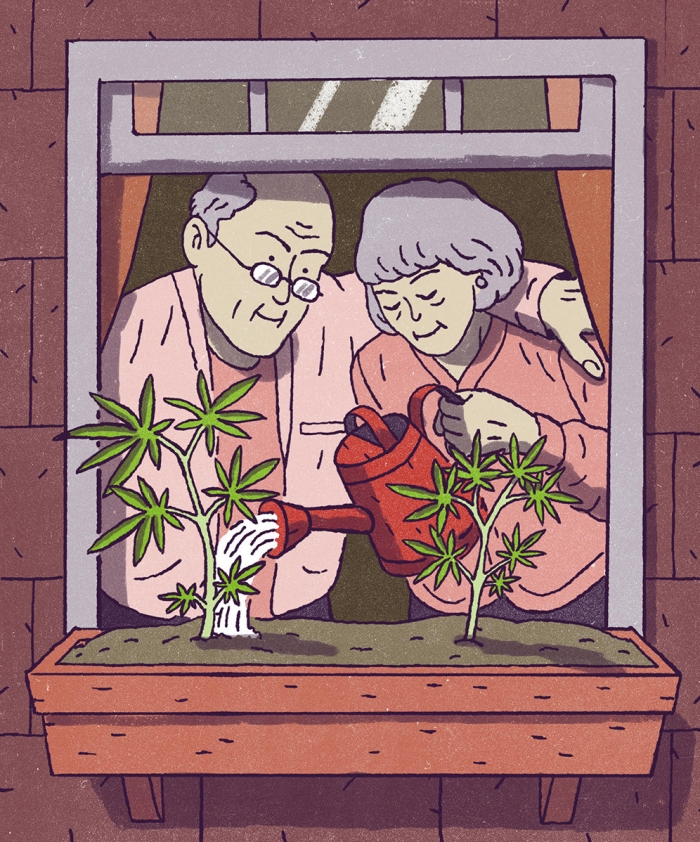Vermont's DIY Approach on Marijuana

Vermont is on the verge of becoming the ninth state to legalize the recreational use of marijuana, but, being Vermont, it is taking an earthier, grow-it-yourself approach — one that could become a model for others.
Vermont is not asking voters to approve a ballot proposal and it is not allowing for-profit businesses to grow and sell the drug, at least not right away. Instead, its lawmakers passed a bill this month that would let people 21 and older keep two flowering and four young marijuana plants at home. In addition, people 21 and older could possess up to one ounce of the drug. The bill would also create an independent commission to propose legislation that could later be used to create a regulated market for marijuana with commercial growers and retailers.
Vermont’s path resembles that of the District of Columbia, where residents voted in 2014 to let people 21 and older grow up to six marijuana plants. Proponents of the home-grow model say it represents a third approach that falls somewhere between criminalizing use of the drug and creating a market in which businesses have an incentive to encourage marijuana use.
A big benefit of the Vermont bill is that it gives lawmakers time to study the effects of legalization before deciding whether to allow marijuana businesses. Governments could use that time to come up with regulations to keep teenagers and young adults from using the drug, since there is some evidence that marijuana can have adverse effects on the developing brain. This should be appealing to lawmakers who recognize the problems associated with the war on drugs but are worried that allowing commercial sales could lead to the marijuana equivalent of Big Tobacco — a powerful industry that seeks to market its products to children and that lobbies lawmakers to rescind or water down public health regulations.
Gov. Phil Scott, a Republican, has until midnight Wednesday to sign or veto the Vermont bill, which will become law if he does neither. Mr. Scott says he will announce his decision on Wednesday. He ought to sign the bill for all the reasons other states have decided to end prohibition. The criminalization of marijuana has been a disaster, leading to long prison sentences for nonviolent drug offenders, who are disproportionately members of minorities. In addition, there is a growing body of evidence that the drug is not nearly as harmful as the federal and state governments have long thought.
Mr. Scott should also keep in mind that regardless of what he does, Vermonters will soon have easy access to legal weed. Last November voters in nearby Maine and Massachusetts approved proposals to legalize marijuana, and officials in the two states are developing the rules for regulated markets. Elsewhere in New England, Democratic lawmakers in Connecticut recently proposed legalizing the commercial sale of marijuana, and a Rhode Island House committee voted last week to create a commission to study the issue.
If Mr. Scott vetoes the bill, he will encourage people to drive across state lines to get their pot or to continue relying on the black market. It would be far better to sign this sensible measure and work with the Legislature to find the best ways to regulate markets in the future.
420 Intel is Your Source for Marijuana News
420 Intel Canada is your leading news source for the Canadian cannabis industry. Get the latest updates on Canadian cannabis stocks and developments on how Canada continues to be a major player in the worldwide recreational and medical cannabis industry.
420 Intel Canada is the Canadian Industry news outlet that will keep you updated on how these Canadian developments in recreational and medical marijuana will impact the country and the world. Our commitment is to bring you the most important cannabis news stories from across Canada every day of the week.
Marijuana industry news is a constant endeavor with new developments each day. For marijuana news across the True North, 420 Intel Canada promises to bring you quality, Canadian, cannabis industry news.
You can get 420 Intel news delivered directly to your inbox by signing up for our daily marijuana news, ensuring you’re always kept up to date on the ever-changing cannabis industry. To stay even better informed about marijuana legalization news follow us on Twitter, Facebook and LinkedIn.




